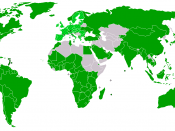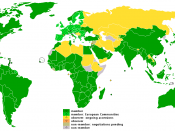The World Trade Organization (WTO) is the only international organization dealing with the global rules of trade between nations. Their goal is to give consumers and producers a greater choice of finished products, components, raw materials, and services that they use. They make this happen by ensuring that trade flows smoothly, predictably, and freely as possible.
The United States is proposing ambitious reforms for agricultural trade in the World Trade Organization (WTO) negotiations. The U.S. proposal on export competition, market access and domestic support would result in reductions in trade barriers for agricultural products, greater equity in world agriculture, and expanding growth opportunities for the sale of agriculture products.
Export Subsidies. The U.S. gives a five year plan, with reductions being phased out during these five years in equal annual increments, which will eliminate export subsidies.
The European Union has recourse to extensive use of export subsidies and spent two billion dollars in 2000.
The U.S. has the same ability, but only spent twenty million in 2000.
State Trading Enterprises. The U.S. is proposing the elimination of export monopolies. This will allow any producer, distributor, or processor to export agricultural products.
Export Tax. The U.S. wants to prohibit export taxes on agricultural products. An exception would be made for developing countries for revenue generation purposes. The WTO allows countries to impose export taxes on agricultural products with next to no restrictions. These taxes can really hurt the market especially when applied during areas of global short supply. They can also be used to discourage exports on basic products and encourage exports on produced products.
The U.S. is constitutionally prohibited from levying export taxes.
Tarriffs. The U.S. is proposing the use a harmonizing formula called the Swiss Formula.
The Swiss 25 formula is a mathematical equation, which results in...


